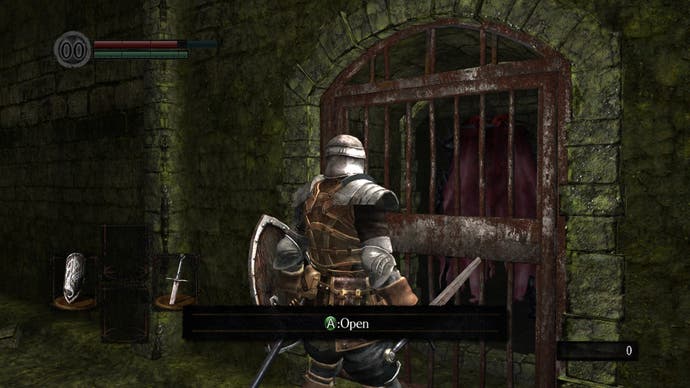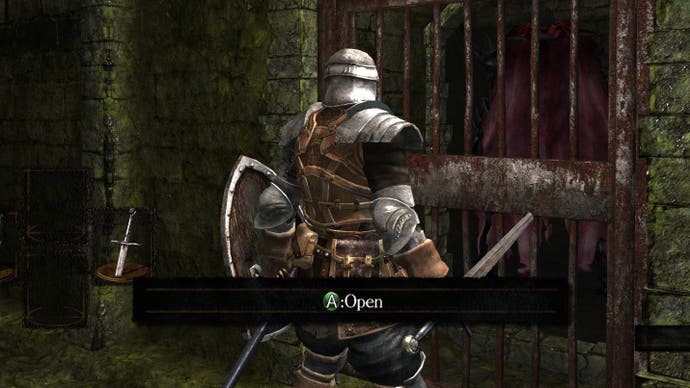Meet the mind behind the first Dark Souls mega-mod
Three men in a jacket.
It might seem strange to frame it this way, but the act of modifying your favourite game is tantamount to admitting it could've been just a bit better: that maybe the developers should have taken a turkey baster to the gloopy Blood Soldiers of Un-Garth, that the instant-kill spike trap right before the save point was perhaps just a bit too punitive. It's ironic it takes an ardent superfan to recognise the true flaws in a work, no matter how great - it's only by fully internalising where the brilliant design shines through that you can recognise the dusty corners that could use a bit more illumination. Of course, mods can never truly complete even the most flawed games, at least if we hold the creator's original vision as the blueprint - the modder's own voice adds to the experience, editing and compensating and harmonising in a way that might be more pleasant than the original, but irrevocably changing the nature of the performance in the process.
It should be no surprise, then, that Scott "Grimrukh" Mooney's Daughters of Ash project for the PC version of Dark Souls gives us one of the all-time great examples of this dichotomy. The Souls games aren't exactly known for their mirth - what with the shattered world full of wandering eidolons and all - but there's a vein of deeply weird humour that hums underneath the windswept cliff-faces and desolate settlements. While this usually manifests itself in the cackles of depraved merchants and the ragdoll-like flailing of the series' memetic yet indomitable skeletons, perhaps the most-misunderstood example is Pinwheel, the sorcerous boss of the Catacombs.
Most agree Pinwheel is laughably easy to defeat compared to the series' gallery of fearsome foes, casting easy-to-avoid spells and floating aimlessly in place while the Chosen Undead hacks at its bulbous hide. You don't have to scroll very far on any Souls forum to find some well-meaning player referring to this particular part of the game as disappointing or badly designed. What many players don't realise is there's fairly strong evidence Pinwheel was intended to be a joke boss fight from the very start. According to multiple fan sources, the boss's Japanese name refers to a comedy act where two people share an oversized coat in order to engage in some clumsy antics, similar to the Whose Line Is It Anyway? skit Helping Hands. Viewed from this vantage, since Pinwheel is little more than three bodies Frankensteined together, the punchline seems to be he's far too uncoordinated to put up much of a fight beyond cloning himself endlessly.
In Daughters of Ash, however, the player becomes the victim of the jape. After you deliver the smackdown to Pinwheel the first time, he staggers back to life with no less than a dozen phantoms, all of whom blast you with devastating beams. He sends in the clones almost as fast as you can kill them with a slow, sweeping weapon like the Zweihander, and when you finally manage to land a blow, he teleports out of your grasp. When I tell Mooney I struggled more with this augmented mega-Pinwheel than the majority of his new bosses, including several built from the ground up around content developer From Software cut from the game, such as the Darkwraith general known as Ja-Yearl, he can't help but meditate on the tension between creator and modder himself. "Yeah, I mean, Pinwheel was probably too easy to begin with, even for a joke boss, and now he's probably too hard," he says, laughing. "That was one of the few 'do you get this?' moments I put in there. I wanted the mod to be playable to someone who hadn't actually finished the game, but I also recognised 99.9 per cent of people playing it had already beaten Dark Souls multiple times. So it was definitely a balancing act."
Arguably the first mega-mod for one of the most beloved games of its generation, Daughters is an unfathomably ambitious work, which makes it all the more surprising to discover it's Mooney's first mod project. An Aussie now residing in the US, Mooney's background is in maths, but he picked up programming skills as part of his day job. While it took a few tries for him to truly immerse himself in the cult of Souls fandom - quitting in his early attempts to ring the two bells - he now calls them his favourite games of all time. He knew early on he wanted to play around with Miyazaki's toys, but, as he explains, no-one really had the tools for such an endeavour until recently.
In particular, it was modder HotPocketRemix who determined how the event scripts function in the game, thanks in part to a file a programmer left in the game code, which opened up the possibility of custom character interactions and side-quests that give Daughters its unique flavour. "He uploaded two YouTube videos to help explain them. There were less than a thousand views on each of them, but fireworks just started going off in my head when I saw them. The possibilities seemed immense," Mooney says. By the time the first mods that took advantage of this new knowledge emerged onto the scene, such as the Scorched Contract, Mooney was already knee-deep in crafting what would eventually become Daughters of Ash.
Since modders haven't quite figured out how to plug new assets into the game without utterly smashing the game to bits, Daughters of Ash resembles more of a thorough reworking of Dark Souls than a "total conversion". Bonfires are shifted over by a few rooms, familiar foes behave quite differently, and vital items, such as keys, are buried in secret locations less-observant players might've never explored on a first run. As Mooney himself states, Daughters of Ash is a testament to how seemingly-small changes - for example, the infamous Hellkite Drake aggressively roasts another bridge in the early game, which forces you to take a backward route through Darkroot that leads to the first of the new bosses - add up to make an experience that feels quite distinct from the original game, even if the actual materials are mostly synonymous.
"I definitely made a distinct effort to move a lot of the items considered to be optimal, or game-breaking," Mooney says. "For example, everybody knows the Zweihander is in the graveyard at the beginning of the game, everybody knows the Black Knight Halberd is going to be stronger and faster than most of the weapons you find in the late game. When you make decisions to do that, you're just sort of moving where the water flows, and it ends up settling down to whatever the next channel is. But I think there's a lot of value in making those players find the next-optimal thing, it gives them that sense of 'first-run' challenge I think a lot of us want."

Mooney is refreshingly open about what the process of releasing a highly-anticipated mod he spent 18 months creating was like. By his own admission, he made several key mistakes he hopes other modders take care not to repeat. For one, the statement accompanying the project's initial rollout claimed there was something like "twice the content" of the original game, which the developer says was an attempt to garner attention from a potentially-lethargic fanbase. "I learned pretty quickly you should never say things like that, never put a number to things, because people will always call you out on it," he says. "But I changed it really quickly, and people forgave me for it."
In that statement, Mooney also called the mod his vision of what Dark Souls might've been if FromSoftware had given it an additional six months in the pipe. While he stops short of totally disavowing that statement, he says it might've given people the wrong impression. The biggest headache came when streamers found evidence of a second version of final boss Gwyn's "boss soul" in a blacksmith's menu, essentially revealing the existence of a super-secret boss fight Mooney hoped would remain hidden for weeks. "Once they knew it was there, I figured the backlash would be coming soon, since all these streamers were trying all these weird methods to unlock it," he says. "I ended up giving them some hints."
But as a mod for a famously-buggy port developed by a studio unfamiliar with the PC platform, Daughters balances on a thin, jury-rigged fulcrum Mooney has to constantly adjust. And when the carefully-constructed stack tumbles over, it's often impossible to know why. "A lot of people don't realise the limitations of Dark Souls modding. And that's fine, because why would they?" he says. "But compared to a lot of other games, this is an incredibly volatile game to mod. For example, every item in the game has its own ID, and the ways those IDs can mess each other up just seem unlimited. Same thing with the AI scripts. I spent a full three months debugging the project, and it still wasn't quite enough... I was shocked the big YouTubers like LobosJr didn't run into more glitches. I think that was a very lucky break."
Now, several months after the mod's big release, Mooney is still hard at work porting Daughters of Ash to the remastered version of Dark Souls, which is the only one available for purchase on PC. While he says it's taking a bit longer than he expected, after that, he'd like to make mod tools that make it easier for fellow fans to hack their dream scenarios into the dusky world of Lordran. Beyond that, Mooney aims for a career in independent games, using the same focus on conditional side-quests and complex NPC interactions that have made Daughters of Ash such a success. "Believe it or not, I think the next thing I'm going to make isn't going to be much of an action game at all," he says. "I've had my fill. And I don't think you can really do it much better then Souls, anyway."




